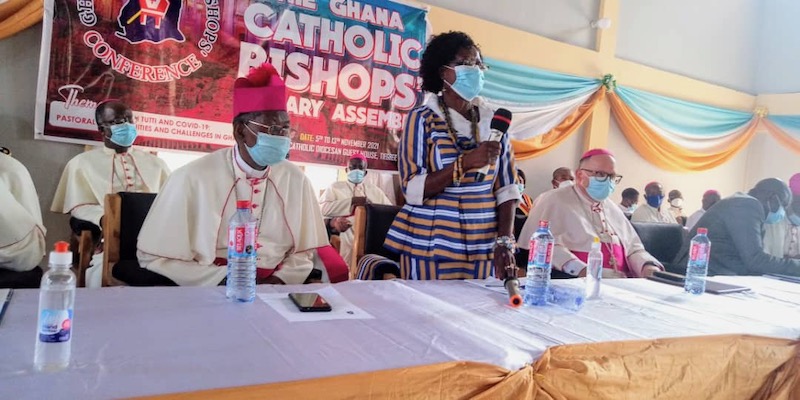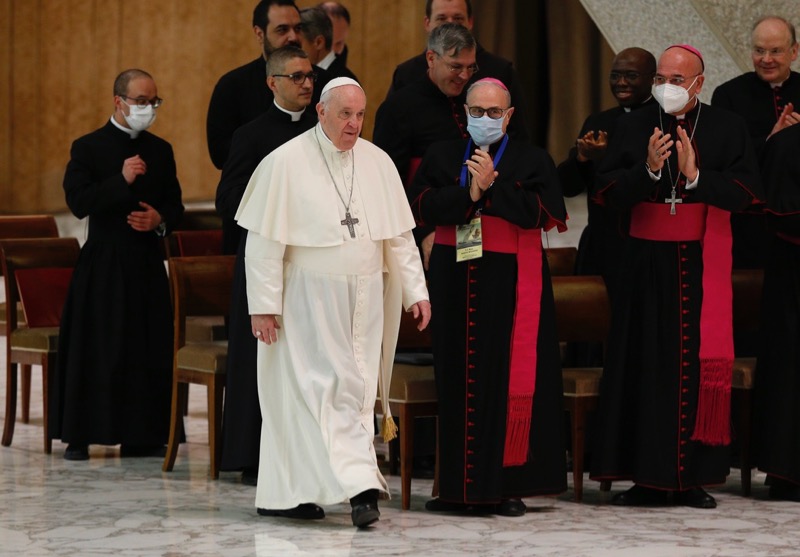Pope Francis has called on the leaders of the Church’s central administration to undergo a “synodal conversion” by embracing a working style characterised by humility, transparency and an ability to listen.
In his annual address to the cardinals, bishops and monsignors who work in the Vatican, the 85-year-old Pope said the Roman Curia is “not merely a logistical and bureaucratic instrument”, but the first body in the Church “called to bear witness”. Its effectiveness, Francis said, is linked to its ability to embrace a synodal “style” that is more inclusive and comfortable with diversity.
“If the Gospel proclaims justice, we must be the first to try to live transparently, without favouritism or cliques. If the Church follows the path of synodality, we must be the first to be converted to a different style of work, of cooperation and communion. All this is possible only by following the path of humility,” Francis told the gathering in the Vatican’s Apostolic Palace this morning.
“The organisation that we must adopt is not that of a business, but evangelical in nature.”
Francis’ remarks come at the end of the year when the Vatican launched an unprecedented financial corruption trial of ten individuals including Cardinal Angelo Becciu, who was once one of the most influential figures in the Roman Curia.
Throughout his pontificate, the Pope has worked to clean up Holy See’s finances and institute a different culture within the curia. This has included trying to move the Roman Curia away from acting like an overlord which routinely reprimanded bishops and theologians judged to have stepped out of line. Francis has instead sought to implement a less hierarchical curia that models listening and servant-leadership, something that is likely to be emphasised in a long anticipated new constitution on the Roman Curia, Praedicate evangelium (“Preach the Gospel”).
Humility, Francis repeatedly emphasised in his speech, lies at the heart of both the Christmas message and the two-year synodal journey which the Church embarked upon earlier in the year.
“Christmas is the time when each of us needs to find the courage to take off our armour, discard the trappings of our roles, our social recognition and the glitter of this world,” the Pope said. “Once we strip ourselves of our robes, prerogatives, positions and titles, all of us are lepers in need of healing. Christmas is the living reminder of this realisation.”
Too often, the Pope explained, people in the Church can live off the “glitter of our armour” and become tempted by a “spiritual worldliness” which is concealed in “everything that usually reassures us: our role, the liturgy, doctrine, religious devotion”.
Warning about the danger of becoming “prisoners of the past”, Francis gave the image of roots and branches: the roots link a community with what has gone before, and the branches point to the future.
“Our living memory of tradition, of our roots, is not worship of the past but an interior movement whereby we constantly bring to our hearts everything that preceded us, marked our history and brought us to where we are today,” he said.
Those who are humble, the Pope explained, “are concerned not simply with the past, but also with the future, since they know how to look ahead, to spread their branches”. By contrast, he said the proud “simply repeat, grow rigid and enclose themselves in that repetition, feeling certain about what they know and fearful of anything new because they cannot control it”.
In his speech, Francis said that the synod process is designed as an antidote to elitist or clericalist attitudes in the Church, and be an “experience of feeling ourselves all members of a larger people” who are able to listen to the “unpredictable ways” God reveals himself.
“The clericalism that, as a temptation, daily spreads in our midst, makes us keep thinking of a God who speaks only to some, while the others must only listen and obey,” Francis warned.
He said that he had recently re-read sections of Lumen Gentium, the Second Vatican Council’s constitution on the Church, which describe the Church as “the people of God”. This, he added, is “oxygen for the soul”.
In line with this model of the Church, Francis urged the cardinals of the curia to ensure “room is made and space found for everyone, even those who appear, hierarchically, to occupy a marginal place” and that this is who creativity occurs. He added: “authority becomes service when it shares, involves and helps people to grow.” Prelates need to avoid “divisions, factions and enemies”, be constantly focussed on the mission of the curia which is to serve the poor and the people of God.
“If the word of God reminds the whole world of the value of poverty, we, the members of the Curia, must be the first to commit ourselves to being converted to a style of sobriety,” the Pope said.
Francis concluded by urging his collaborators to be to “be evangelised by the humility of Christmas and the manger” adding that “only by serving, and by seeing our work as service, can we be truly helpful to everyone”.
After his address, he gave them three books as Christmas presents: Converting Peter Pan: The Fate of Faith in the Society of Eternal Youth, by Fr Armando Matteo, an official at the Congregation for the Doctrine of the Faith; The Discarded Stone: When the Forgotten are Saved, by Italian priest Fr Luigi Maria Epicoco, who has written about lesser known figures in the Bible and The Abused Word, a book written by papal diplomat, Archbishop Fortunatus Nwachukwu, about the damage caused by gossip.



 Loading ...
Loading ...